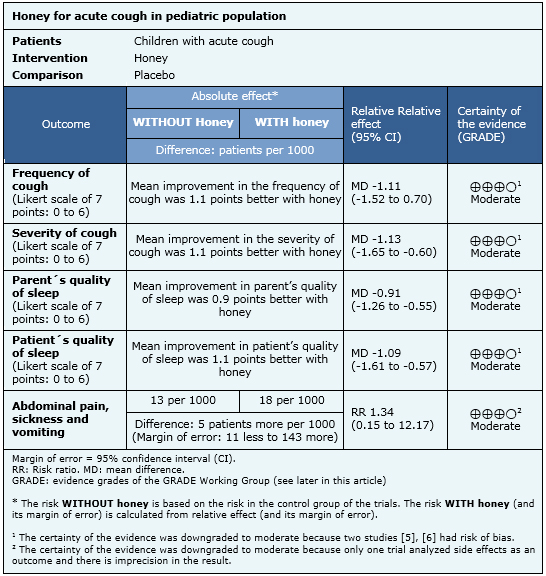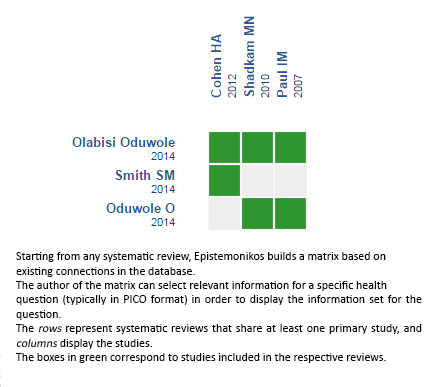 Para Descargar PDF debe Abrir sesión.
Para Descargar PDF debe Abrir sesión.
Cough represents one of the most common reasons for pediatrician consultations. There are many available treatments for symptomatic relief, including honey. Despite its wide availability, there is little knowledge about its benefits. Searching in Epistemonikos database, which is maintained by screening 30 databases, we identified three systematic reviews including three randomized trials. We combined the evidence using meta-analysis and generated a summary of findings table following the GRADE approach. We concluded the use of honey probably decreases the severity and frequency of cough, improves the quality of parent's and patient's sleep, and does not have side effects.
Cough is a complex physiological event consisting of a violent expiration in order to release secretions, foreign material or bronchospasm airway driving and protect the respiratory system from chemical, infectious, mechanical and thermal agents. Acute cough lasts less than four to eight weeks (depending on the definition used). It is not a disease in itself but a symptom related to many respiratory diseases. Depending on the intensity and frequency of the cough, it often leads to a negative impact on the quality of life for both the child and his family, generating a high number of medical consultations.
It has been suggested that honey, due to its antioxidant properties and the release of cytokines, could be used as treatment.
Despite of being a widely available treatment, there is little information about its effects.
We used Epistemonikos database, which is maintained by screening more than 30 databases, to identify systematic reviews and their included primary studies. With this information we generated a structured summary using a pre-established format, which includes key messages, a summary of the body of evidence (presented as an evidence matrix in Epistemonikos), meta-analysis of the total of studies, a summary of findings table following the GRADE approach and a table of other considerations for decision-making.
|
Key messages
|
|
What is the evidence. |
We found three systematic reviews [1],[2],[3] including three [4],[5],[6], randomized controlled trials. Another systematic review [7] was identified in the search, but without included trials, so it is not analyzed in this summary. |
|
What types of patients were included |
One study [4] included patients between 1 and 5 years. The second study [5] included patients between 2 and 18 years. The third study [6] included patients between 2 and 5 years. The three studies included patients with upper respiratory tract infections and nighttime cough of less than 7 days. |
|
What types of interventions were included |
All of the studies [4],[5],[6] evaluated a single dose of honey 30 minutes before sleep. One study compared against placebo [4] and the other two versus no treatment [5],[6]. |
|
What types of outcomes |
The outcomes analyzed were:
|
The information about the effects of honey for the treatment of acute cough is based on three randomized trials [4], [5], [6] including 568 patients. All of the studies reported frequency and severity of cough, and parent’s and children’s quality of sleep. Only one study reported the side effects of honey versus placebo [4].


|
To whom this evidence does and does not apply |
|
| About the outcomes included in this summary |
|
| Balance between benefits and risks, and certainty of the evidence |
|
| What would patients and their doctors think about this intervention |
|
| Resource considerations |
|
|
Differences between this summary and other sources |
|
| Could this evidence change in the future? |
|
Using automated and collaborative means, we compiled all the relevant evidence for the question of interest and we present it as a matrix of evidence.

Follow the link to access the interactive version: Honey versus no treatment or placebo for acute cough in children
The upper portion of the matrix of evidence will display a warning of “new evidence” if new systematic reviews are published after the publication of this summary. Even though the project considers the periodical update of these summaries, users are invited to comment in Medwave or to contact the authors through email if they find new evidence and the summary should be updated earlier. After creating an account in Epistemonikos, users will be able to save the matrixes and to receive automated notifications any time new evidence potentially relevant for the question appears.
The details about the methods used to produce these summaries are described here http://dx.doi.org/10.5867/medwave.2014.06.5997.
Epistemonikos foundation is a non-for-profit organization aiming to bring information closer to health decision-makers with technology. Its main development is Epistemonikos database (www.epistemonikos.org).
These summaries follow a rigorous process of internal peer review.
Conflicts of interest
The authors do not have relevant interests to declare.
 Esta obra de Medwave está bajo una licencia Creative Commons Atribución-NoComercial 3.0 Unported. Esta licencia permite el uso, distribución y reproducción del artículo en cualquier medio, siempre y cuando se otorgue el crédito correspondiente al autor del artículo y al medio en que se publica, en este caso, Medwave.
Esta obra de Medwave está bajo una licencia Creative Commons Atribución-NoComercial 3.0 Unported. Esta licencia permite el uso, distribución y reproducción del artículo en cualquier medio, siempre y cuando se otorgue el crédito correspondiente al autor del artículo y al medio en que se publica, en este caso, Medwave.

Cough represents one of the most common reasons for pediatrician consultations. There are many available treatments for symptomatic relief, including honey. Despite its wide availability, there is little knowledge about its benefits. Searching in Epistemonikos database, which is maintained by screening 30 databases, we identified three systematic reviews including three randomized trials. We combined the evidence using meta-analysis and generated a summary of findings table following the GRADE approach. We concluded the use of honey probably decreases the severity and frequency of cough, improves the quality of parent's and patient's sleep, and does not have side effects.
 Autores:
María Pía Nitsche[1,2], Mónica Carreño[2,3]
Autores:
María Pía Nitsche[1,2], Mónica Carreño[2,3]

Citación: Nitsche MP, Carreño M. Is honey an effective treatment for acute cough in children?. Medwave 2016;16(Suppl 2):e6454 doi: 10.5867/medwave.2016.6454
Fecha de publicación: 30/5/2016

Nos complace que usted tenga interés en comentar uno de nuestros artículos. Su comentario será publicado inmediatamente. No obstante, Medwave se reserva el derecho a eliminarlo posteriormente si la dirección editorial considera que su comentario es: ofensivo en algún sentido, irrelevante, trivial, contiene errores de lenguaje, contiene arengas políticas, obedece a fines comerciales, contiene datos de alguna persona en particular, o sugiere cambios en el manejo de pacientes que no hayan sido publicados previamente en alguna revista con revisión por pares.
Aún no hay comentarios en este artículo.
Para comentar debe iniciar sesión
 Medwave publica las vistas HTML y descargas PDF por artículo, junto con otras métricas de redes sociales.
Medwave publica las vistas HTML y descargas PDF por artículo, junto con otras métricas de redes sociales.
 Oduwole O, Meremikwu MM, Oyo-Ita A, Udoh EE. Honey for acute cough in children. Cochrane Database Syst Rev. 2014 Dec 23;12:CD007094. | CrossRef | PubMed |
Oduwole O, Meremikwu MM, Oyo-Ita A, Udoh EE. Honey for acute cough in children. Cochrane Database Syst Rev. 2014 Dec 23;12:CD007094. | CrossRef | PubMed | Oduwole O, Meremikwu MM, Oyo-Ita A, Udoh EE. Honey for acute cough in children. Evid Based Child Health. 2014 Jun;9(2):401-44. | CrossRef | PubMed |
Oduwole O, Meremikwu MM, Oyo-Ita A, Udoh EE. Honey for acute cough in children. Evid Based Child Health. 2014 Jun;9(2):401-44. | CrossRef | PubMed | Smith SM, Schroeder K, Fahey T. Over-the-counter (OTC) medications for acute cough in children and adults in community settings. Cochrane Database Syst Rev. 2014 Nov 24;11:CD001831. | CrossRef | PubMed |
Smith SM, Schroeder K, Fahey T. Over-the-counter (OTC) medications for acute cough in children and adults in community settings. Cochrane Database Syst Rev. 2014 Nov 24;11:CD001831. | CrossRef | PubMed | Cohen HA, Rozen J, Kristal H, Laks Y, Berkovitch M, Uziel Y, et al. Effect of honey on nocturnal cough and sleep quality: a double-blind, randomized, placebo-controlled study. Pediatrics. 2012 Sep;130(3):465-71. | CrossRef | PubMed |
Cohen HA, Rozen J, Kristal H, Laks Y, Berkovitch M, Uziel Y, et al. Effect of honey on nocturnal cough and sleep quality: a double-blind, randomized, placebo-controlled study. Pediatrics. 2012 Sep;130(3):465-71. | CrossRef | PubMed | Paul IM, Beiler J, McMonagle A, Shaffer ML, Duda L, Berlin CM Jr. Effect of honey, dextromethorphan, and no treatment on nocturnal cough and sleep quality for coughing children and their parents. Arch Pediatr Adolesc Med. 2007 Dec;161(12):1140-6. | PubMed |
Paul IM, Beiler J, McMonagle A, Shaffer ML, Duda L, Berlin CM Jr. Effect of honey, dextromethorphan, and no treatment on nocturnal cough and sleep quality for coughing children and their parents. Arch Pediatr Adolesc Med. 2007 Dec;161(12):1140-6. | PubMed | Shadkam MN, Mozaffari-Khosravi H, Mozayan MR. A comparison of the effect of honey, dextromethorphan, and diphenhydramine on nightly cough and sleep quality in children and their parents. J Altern Complement Med. 2010 Jul;16(7):787-93. | CrossRef | PubMed |
Shadkam MN, Mozaffari-Khosravi H, Mozayan MR. A comparison of the effect of honey, dextromethorphan, and diphenhydramine on nightly cough and sleep quality in children and their parents. J Altern Complement Med. 2010 Jul;16(7):787-93. | CrossRef | PubMed | Mulholland S, Chang AB. Honey and lozenges for children with non-specific cough. Cochrane Database Syst Rev. 2009 Apr 15;(2):CD007523. | CrossRef | PubMed |
Mulholland S, Chang AB. Honey and lozenges for children with non-specific cough. Cochrane Database Syst Rev. 2009 Apr 15;(2):CD007523. | CrossRef | PubMed | Department of Child and Adolescent Health. Cough and Cold Remedies for the Treatment of Acute Respiratory Infections in Young Children. Geneva, Switzerland: World Health Organization; 2001. | Link |
Department of Child and Adolescent Health. Cough and Cold Remedies for the Treatment of Acute Respiratory Infections in Young Children. Geneva, Switzerland: World Health Organization; 2001. | Link |